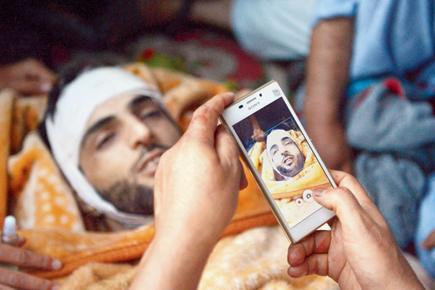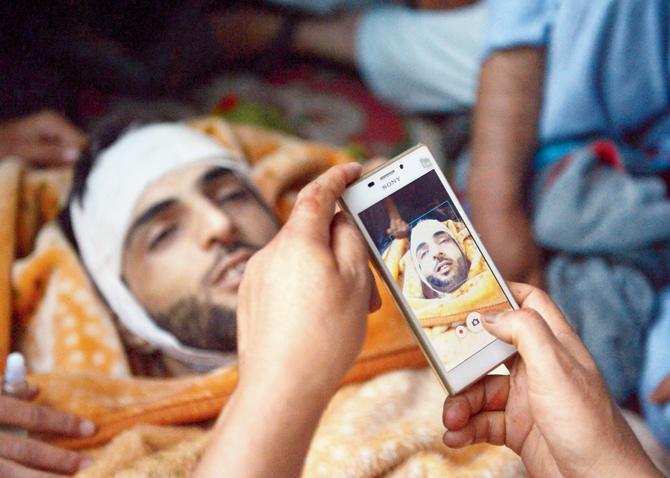When so-called normalcy returns after protests over Burhan Wani’s killing die down, Delhi will find the anti-India sentiment has deepened

 After Hizbul Mujahideen commander Burhan Muzaffar Wani’s (22) death, but before Internet services in the Kashmir Valley were blocked, Facebook was filled with photos of his funeral, thronged by tens of thousands of mourners; with lamentations; and with hyperbolic posts, like the assertion that 5,000 years of Kashmiris’ resilience would continue (posted by a youngster of an establishment family).
After Hizbul Mujahideen commander Burhan Muzaffar Wani’s (22) death, but before Internet services in the Kashmir Valley were blocked, Facebook was filled with photos of his funeral, thronged by tens of thousands of mourners; with lamentations; and with hyperbolic posts, like the assertion that 5,000 years of Kashmiris’ resilience would continue (posted by a youngster of an establishment family).
ADVERTISEMENT

Kashmiri mourners take photographs of the body of Burhan Muzaffar Wani before his funeral at Tral near Srinagar. Pic/AFP
The Republic of India will soon complete 69 years, but as citizens we delude ourselves on many counts. The most glaring is what the Kashmir issue is about: territory, not its people. As a result, we obsess about Pakistan, rather than address Kashmir. The BJP government has tightened the border, stymieing Pakistan’s efforts to send arms across; deployed high-technology, like lasers on the border and sophisticated eavesdropping on cross-border communication; and, through its local coalition partner, has used administrative sops to demonstrate how profitable it is to stay with India than to seek ‘greener’ pastures. And yet, much to Pakistan’s delight, anti-India sentiment in the Valley remains strong, while 1990’s militancy has made a comeback, led by a martyr for the new generation.
The other delusion is that there exists a pro-India constituency in Kashmir. Jammu is undoubtedly pro-India but it is not Kashmir, though many link the two for rhetorical purposes. If Kashmiris come to study or work outside their Valley it is not because they accept India in Kashmir; though it also does not mean they should be denied rentals or jobs or even neighbourly goodwill. Liberals think their sympathy for Kashmiri grievances is a beacon for Kashmiri-India reconciliation, but from the Kashmiri point of view, there is little difference between the conservative Indian, the liberal Indian, or the Indian Leftist. In 69 years, they have all refused to accommodate Kashmiri political aspirations.
The late Ghulam Rasool Kar tried to plant the Congress party flag in the Valley; that’s as pro-India as it gets, considering that Sheikh Abdullah led the Plebiscite Front during the ’50s and ’60s. Yet even Kar, in his final days, told fellow Kashmiris: “Never trust Delhi.” Former spy chief AS Dulat, my co-author on Kashmir: The Vajpayee Years, says this about the Sheikh’s son, Dr Farooq: “In the end, he’s a Kashmiri.” Dr Farooq — the man whom separatists hate the most — like any Kashmiri, does not trust Delhi.
Despite 69 years of opportunity, India has not earned Kashmiri trust. This is not surprising, seeing the reactions in Delhi — by journalists, some of whom have forgotten non-partisanship — that Burhan Wani was a terrorist who deserved death; or that some international jihadi syndicate used his funeral to expand the war against India. All those mourners on Saturday did not think he was a terrorist. Only a colonial oppressor, like Imperial Britain, would perceive an entire population as terrorist or terrorist-supporting.
Some Indians focus on the fact that Burhan had picked up the gun. It’s ironic, given that India has turned the Valley into a part-garrison, part-open air prison. One even said Kashmiris should pursue their grievances in other ways, which is not only patronising but also ignores how in 69 years, Kashmiris are still stuck at square one — after the brief promise of AB Vajpayee, there was the lost decade under Manmohan Singh, and now the panic-inducing Narendra Modi.
The talk of an international jihadi movement is misleading. Kashmir saw significant evaporation of global support following 9/11. Perhaps that’s why there never was an al Qaeda in the Valley; though some Kashmiris may support Islamism, the majority clearly don’t want their nationalism diverted or diluted by it.
Basically, Kashmiris don’t trust us because we don’t trust them. To us they’re Trojan Horses for Pakistan; we don’t sit down to talk with them and instead treat them as Pakistani agents; and we won’t even bring members of their ‘collaborator’ class, like Dr Farooq, to our high table. We talk of a deal with separatist Nagas that includes separate flags and passports, but never think of something similar for Kashmir, because unlike Nagaland, it is a legacy of Partition.
Finally, we cannot expect Kashmiris to trust us if we’re arrogant. As reported in a national daily, the decision to kill Burhan was taken two months ago, despite an opinion in “a section of the establishment” to take him alive. He could have been caught, but the gang in power in Delhi wanted to send a tough message. It wants to rule by fear.
After the protests over Burhan’s death die down, the anti-India sentiment will deepen even if a superficial ‘normalcy’ returns. And when National Security Advisor Ajit Doval comes to the end of his tenure, he will find that he was neither able to sort out the problem, nor manage it, much less erase it completely. He will find that history, too, takes no prisoners.
Senior journalist Aditya Sinha is a contributor to the recently published anthology House Spirit: Drinking in India. He tweets @autumnshade. Send your feedback to mailbag@mid-day.com
 Subscribe today by clicking the link and stay updated with the latest news!" Click here!
Subscribe today by clicking the link and stay updated with the latest news!" Click here!






